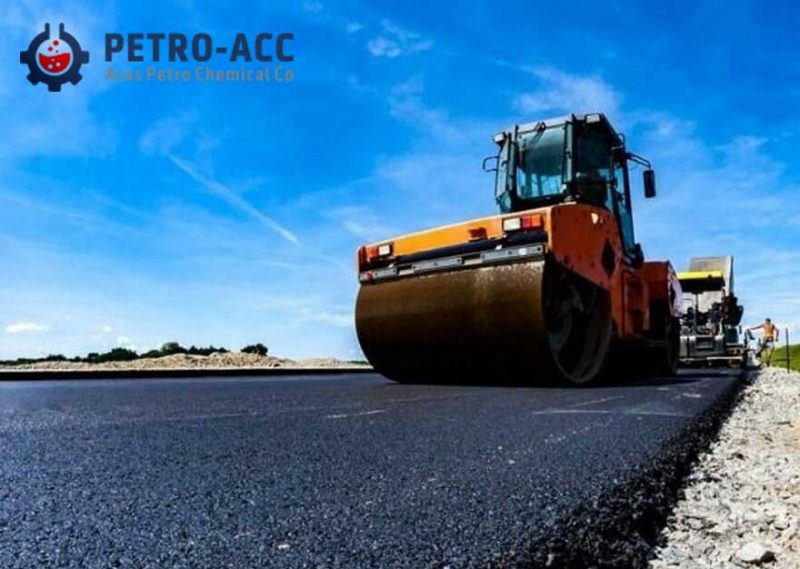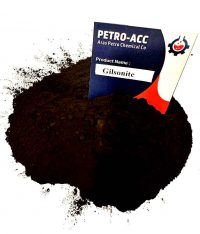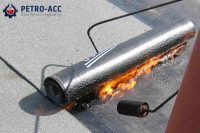Gilsonite is a Natural Bitumen or Mineral Bitumen and it is a naturally occurring hydrocarbon resin that is often used as an additive in asphalt to improve its performance. When added to asphalt, this mineral bitumen enhances the asphalt’s ability to resist deformation and cracking, making it a popular choice for road construction and repair.
Gilsonite is typically added to asphalt in the form of a powder or granules, which are mixed with the hot liquid asphalt binder before it is applied to the road surface. The addition of Gilsonite can improve the asphalt’s resistance to high temperatures, oxidation, and aging, as well as improve its adhesion to aggregates and other materials.
In addition to its use in asphalt, this Natural Bitumen is also used in a variety of other applications, including in the production of paints, inks, adhesives, and plastics. Its unique properties make it a valuable additive for enhancing the performance of a wide range of materials.
BENEFITS OF USING GILSONITE IN ASPHALT
Here are some of the benefits of using Gilsonite in asphalt:
- Improved durability: Natural Bitumen is a highly durable material that can withstand harsh weather conditions, heavy traffic, and other environmental factors. Adding Gilsonite to asphalt can improve its durability, extend its lifespan, and reduce the need for costly repairs and maintenance.
- Increased flexibility: natural asphalt has a unique molecular structure that allows it to increase the flexibility of asphalt. This can help prevent cracking and other forms of damage that can occur due to temperature changes and other stressors.
- Enhanced bonding: Gilsonite can help improve the bonding between asphalt and aggregate, which can lead to a stronger and more durable pavement. This can also help reduce the risk of water damage and other types of wear and tear.
- Improved resistance to oxidation: Asphalt is vulnerable to oxidation, which can cause it to become brittle and prone to cracking. Gilsonite is a natural anti-oxidant that can help prevent this process and extend the lifespan of the asphalt.
- Reduced maintenance costs: By improving the durability and lifespan of asphalt, the use of Gilsonite can help reduce the need for costly repairs and maintenance. This can save time and money in the long run, making it a cost-effective option for asphalt construction and maintenance projects.
Using Gilsonite in asphalt can offer a range of benefits, including improved durability, flexibility, bonding, resistance to oxidation, and reduced maintenance costs.
METHODS OF MIXING GILSONITE WITH ASPHALT
There are several methods of mixing Gilsonite with asphalt, including:
- Dry mixing: In this method, Gilsonite is added to the aggregate mix before the asphalt is added. The Gilsonite and aggregate are mixed together and then the asphalt is added, and the mixture is then compacted. This method is most commonly used for hot mix asphalt.
- Wet mixing: In this method, Gilsonite is added directly to the liquid asphalt binder before it is mixed with the aggregate. The Gilsonite is first dissolved in a solvent such as diesel fuel and then added to the asphalt. The mixture is then heated and mixed thoroughly before the aggregate is added.
- Pelletized Gilsonite: In this method, Gilsonite is processed into small pellets that can be easily added to the asphalt mix. The pellets are added to the asphalt during the mixing process and are melted and blended in with the other ingredients.
- Modified Asphalt Binder: In this method, Natural asphalt is added to the asphalt binder during the refining process. This creates a modified asphalt binder that has improved properties such as increased elasticity, reduced thermal cracking, and increased resistance to rutting.
Each of these methods has its advantages and disadvantages, and the choice of method will depend on the specific application and desired performance characteristics of the asphalt mix.
PERCENTAGE OF MIXING GILSONITE WITH ASPHALT
The percentage of mixing Gilsonite with asphalt can vary depending on the specific application and desired outcome. it is a natural resinous hydrocarbon that is often added to asphalt to improve its performance properties, such as durability, flexibility, and resistance to rutting and cracking.
In general, the recommended percentage of Natural Bitumen to be added to asphalt ranges from 2% to 8% by weight of the asphalt binder. However, the optimum percentage of Gilsonite may vary depending on the type of asphalt, the climate conditions, the traffic volume, and the specific performance requirements of the asphalt mix.
It is important to note that adding too much mineral bitumen to the asphalt mix can result in excessive stiffness, reduced workability, and increased susceptibility to moisture damage. Therefore, it is recommended to conduct laboratory tests and field trials to determine the optimum percentage of Gilsonite to be used in a specific asphalt mix design.
HOW GILSONITE CAN REDUCE ASPHALT COSTS
As a result, using Gilsonite in asphalt mixes can help to reduce the overall cost of asphalt construction in several ways:
When Natural Bitumen is added to asphalt mixes, it can increase the durability of the asphalt. This means that the asphalt will last longer and require less maintenance over time, which can help to reduce the overall cost of the asphalt construction.
Natural Bitumen can also improve the elasticity of the asphalt, which can help to reduce cracking and other forms of damage. This means that the asphalt will be less likely to require repairs or replacement, which can help to reduce the overall cost of the asphalt construction.
Lower mix temperatures: when we are adding this Natural Bitumen to Asphalt can also help to lower the mixing temperature of asphalt, which can reduce the amount of energy required during the production process. This can help to reduce the overall cost of asphalt construction by reducing energy consumption.
Reduced need for additives: By using this mineral bitumen in asphalt mixes, there may be a reduced need for other additives, such as polymers or other binders. This can help to reduce the overall cost of asphalt construction by reducing the number of materials that need to be purchased and added to the mix.
So we can say that using this mineral bitumen in asphalt mixes can help to reduce the overall cost of asphalt construction by increasing durability, improving elasticity, lowering mix temperatures, and reducing the need for other additives.








